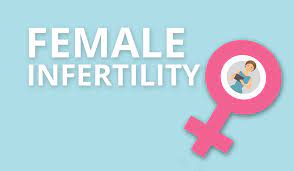Infertility is characterized as a medical condition where an individual faces challenges in becoming pregnant. Experiencing difficulty in achieving pregnancy typically refers to challenges in conceiving despite actively trying to conceive without the use of any form of birth control.
Diagnosis of female infertility:
The diagnosis of female infertility involves a comprehensive assessment of various factors that may impact a woman’s reproductive health.
One crucial aspect is hormonal testing, which helps evaluate the levels of essential hormones involved in the menstrual cycle and fertility. Tests commonly conducted include measuring the levels of luteinizing hormone (LH), follicle-stimulating hormone (FSH), prolactin, anti-Müllerian hormone (AMH), and others.
LH and FSH play essential roles in regulating the menstrual cycle, with imbalances potentially indicating issues such as polycystic ovary syndrome (PCOS) or ovarian dysfunction. Elevated prolactin levels may suggest conditions affecting ovulation. Anti-Müllerian hormone is associated with ovarian reserve, providing insights into a woman’s fertility.
Standard diagnostic procedures include an X-ray test outlining the internal shape of the uterus and detecting potential blockages in the fallopian tubes. Additionally, ultrasound scans can assess the ovaries, uterus, and fallopian tubes, checking for conditions like endometriosis.
For cases of unexplained infertility, initial cycles of ovarian stimulation with close monitoring are recommended.
Criteria used to diagnose infertility in females
There are two criteria used to diagnose infertility in females:
Individuals aged 35 and above experiencing challenges in conception are diagnosed with infertility after six months of regular unprotected sexual intercourse.
For those under the age of 35, infertility is diagnosed if conception remains elusive after twelve months of regular unprotected sexual intercourse.
Various factors can cause infertility in females, including age, hormonal imbalances, lifestyle choices, environmental factors, and medical conditions.
Types of female infertility:
There are two types of female infertility:
- Primary Infertility
- Secondary Infertility
Primary Infertility: Primary infertility refers to the inability to conceive, even after engaging in regular unprotected sexual intercourse for more than 1 year. Causes of primary infertility can vary and may include issues with ovulation, fallopian tube blockages, uterine abnormalities, hormonal imbalances, or male factor infertility.
On the other hand,
Secondary infertility: Secondary infertility refers to the inability to get pregnant again after having at least one successful pregnancy and childbirth. Causes of secondary infertility can be similar to those of primary infertility, including age-related decline in fertility, changes in reproductive health, or the development of new health conditions since the previous pregnancy.
Prevalence of female infertility
Studies indicate that childlessness rates in women aged 25-49 range from 1-10% globally.
Diseases that may cause female Infertility
There are many possible causes of female infertility. It may be caused by one or more of the following factors:
Ovulation disorders:
Ovulation disorders, resulting from irregularities in reproductive hormone regulation by the hypothalamus, pituitary gland, or ovary, account for most cases of infertility.
Hormonal Imbalance:
The four hormones involved in regulating the menstrual cycle and ovulation are follicle-stimulating hormone (FSH), luteinizing hormone (LH), prolactin, and anti-müllerian hormone (AMH). These hormones work together to ensure the timely release of a mature egg and the preparation of the uterus for potential pregnancy. Any disruption in their production or regulation can lead to fertility issues and difficulties in becoming pregnant.
Excess stress and weight changes can disrupt hormone production and ovulation, leading to irregular or absent periods.
Primary ovarian insufficiency:
Premature ovarian insufficiency, which is also referred to as primary ovarian failure, is a condition that occurs when the ovary stops producing eggs.
This condition causes a decrease in estrogen production in women who are under 40 years of age. Premature ovarian failure can be caused by an autoimmune response or the early depletion of eggs from the ovary, which may be due to genetics or chemotherapy.
Polycystic Ovary Syndrome (PCOS):
Polycystic ovary syndrome (PCOS) is a condition that causes a hormonal imbalance that affects ovulation. Characterized by elevated androgen levels, irregular menstrual cycles, and the presence of small cysts on the ovaries, PCOS can impact various aspects of a woman’s health.
Common symptoms include hormonal imbalances, irregular periods, weight gain, and potential fertility issues. Women with PCOS may also experience insulin resistance and obesity, abnormal hair growth on the face or body, and acne. It is the leading cause of female infertility.
Hyperprolactinemia (Too much prolactin hormone):
Elevated levels of prolactin hormone can hinder estrogen production, contributing to infertility in females. This hormonal imbalance, known as hyperprolactinemia, disrupts the normal menstrual cycle and reproductive processes.
Medications, particularly certain antidepressants, antihypertensive agents, and drugs affecting bowel motility, can induce this elevation in prolactin levels, exacerbating the impact on estrogen regulation. As a consequence, irregular menstrual cycles and anovulation may occur, impairing a woman’s ability to conceive.
Tubal Factor Infertility:
Tubal factor infertility is also known as fallopian tube infertility. It is caused by blocked or damaged fallopian tubes.
Fallopian tubes are ducts that connect the uterus to each ovary. When a woman has a defective fallopian tube, it can result in an inability to fertilize the egg, which can make conception difficult.
Various causes can lead to damage or blockage of the fallopian tubes:
These include pelvic inflammatory disease, which is an infection of the uterus and fallopian tubes due to sexually transmitted diseases such as chlamydia or gonorrhoea.
Additionally, surgeries performed in the abdomen or pelvis, including those for ectopic pregnancy, can also result in damage or blockage of the fallopian tubes. An ectopic pregnancy occurs when a fertilized egg implants and grows outside the uterus, often in a fallopian tube.
Endometriosis:
Endometriosis is a condition where tissue similar to the lining of the uterus grows outside of it, causing painful and heavy periods, as well as fertility issues.
Cervical or Uterine Issues:
Several issues related to the cervix or uterus can affect fertility.
Fibroids:
Fibroids are non-cancerous growths in the uterus that can sometimes interfere with pregnancy by blocking the fallopian tubes or changing the shape of the uterus. However, many women with fibroids can still get pregnant and carry a healthy pregnancy to term. Treatment options for fibroids during pregnancy may vary depending on the size, location, and symptoms associated with the fibroids.
Unusual shape of the uterus:
An unusual shape of the uterus can lead to difficulties in getting pregnant or maintaining a pregnancy. This could be caused by various factors such as genetic abnormalities, exposure to certain medications or chemicals, or anatomical defects. Women with these conditions may require specialized medical interventions to enhance their chances of conceiving and carrying a healthy pregnancy to term.
Narrowing of the cervix:
Cervical stenosis is a medical condition in which the cervix is narrowed or has an inherited malformation or damage.
Research suggests that it is a potential cause of infertility in women, although it is uncommon. This condition can make it difficult for sperm to pass through the cervix, hindering the natural fertilization process. Therefore, a narrower cervical opening can pose challenges for conception.
Pelvic Inflammatory Disease (PID):
Pelvic Inflammatory Disease (PID) is a medical condition that can have a significant impact on a woman’s fertility. PID is caused due to infections in the reproductive organs, which can lead to scarring. This, in turn, can adversely affect the normal functioning of the reproductive tract.
Research suggests that PID can cause permanent damage to the reproductive tract, leading to infertility. Approximately one in ten women with PID may experience infertility due to scarring, particularly within the fallopian tubes. It is crucial to treat the infection promptly as if left untreated, PID can cause irreversible damage to the reproductive system.
Risk factors for infertility
The following factors can increase the risk of infertility in females.
Weight: Being overweight or underweight can increase the risk of infertility in females. Maintaining a healthy BMI can improve your chances of conception.
Age: As women age gets advanced, the quality and quantity of their eggs decrease, which reduces the chances of having a healthy pregnancy after the age of 30, and the chances of miscarriage increase.
Smoking: Smoking before infertility treatment can increase the risk of miscarriage due to damage to fallopian tubes and cervix.
Alcohol consumption: Drinking too much alcohol can decrease a person’s ability to conceive a child.
Infections of reproductive organs: Infections such as chlamydia or gonorrhoea can harm your fallopian tubes, leading to fertility problems.
Management and Treatment:
For women who are considering pregnancy, these tips may be helpful:
- Achieve balanced weight
- Reduce emotional stress
- Eat a healthy and balanced diet
- Physical Activity
The Australian Concept Infertility Medical Center offers a range of advanced fertility treatments to address female infertility. These include Intrauterine Insemination (IUI), In Vitro Fertilization (IVF), Ovulation Induction, and other specialized therapies.
Australian Concept employs state-of-the-art technology and a team of experienced and internationally trained fertility specialists to provide personalized and effective infertility solutions. The centre focuses on comprehensive evaluations and tailored treatment plans to maximize the chances of conception for individuals experiencing fertility challenges. The Australian Concept Infertility Medical Center has assisted over 15,000 families in experiencing the joys of parenthood by providing support and guidance, enabling them to successfully conceive.
For personalized advice and more detailed information on treatments, booking a consultation with Australian Concept Infertility Medical Center specialists is recommended.
FAQS:
How is infertility diagnosed in females?
Infertility in females is diagnosed based on two criteria: six months of regular unprotected sexual intercourse for those over 35 and one year for those under 35.
What are the common diseases causing female infertility?
Various factors contribute, including ovulation disorders, hormonal imbalances, primary ovarian insufficiency, PCOS, hyperprolactinemia, tubal factor infertility, endometriosis, and cervical or uterine issues.
What are the risk factors for female infertility?
Risk factors include weight issues, age, smoking, alcohol consumption, and infections of reproductive organs. Maintaining a healthy weight, reducing stress, and adopting a healthy lifestyle can positively influence fertility.
What treatments are available for female infertility at Australian Concept?
Australian Concept provides cutting-edge fertility treatments, such as Intrauterine Insemination (IUI), In Vitro Fertilization (IVF), and Ovulation Induction, to improve the chances of conception through assisted reproductive technologies. Consulting with the Australian Concept Infertility Medical Center is recommended for more detailed information on treatments and personalised advice.


 Home
Home









